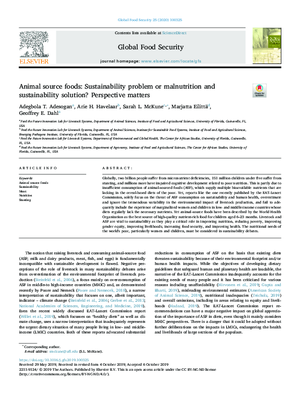Animal source foods: Sustainability problem or malnutrition and sustainability solution? Perspective matters
Globally, two billion people suffer from micronutrient deficiencies, 151 million children under five suffer from stunting, and millions more have impaired cognitive development related to poor nutrition. This is partly due to insufficient consumption of animal-sourced foods (ASF), which supply multiple bioavailable nutrients that are lacking in the cereal-based diets of the poor. Yet, reports like the one recently published by the EAT-Lancet Commission, solely focus on the threat of ASF consumption on sustainability and human health, overestimate and ignore the tremendous variability in the environmental impact of livestock production, and fail to adequately include the experience of marginalized women and children in low- and middle-income countries whose diets regularly lack the necessary nutrients. Yet animal-source foods have been described by the World Health Organization as the best source of high-quality nutrient-rich food for children aged 6–23 months. Livestock and ASF are vital to sustainability as they play a critical role in improving nutrition, reducing poverty, improving gender equity, improving livelihoods, increasing food security, and improving health. The nutritional needs of the world's poor, particularly women and children, must be considered in sustainability debates.
https://biodiversitylinks.org/learning-evidence/wild-meat-collaborative-learning-group/evidence-collection/evidence-inbox/animal-source-foods_wild-meat.pdf/view
https://biodiversitylinks.org/learning-evidence/wild-meat-collaborative-learning-group/evidence-collection/evidence-inbox/animal-source-foods_wild-meat.pdf/@@download/image/image.png
File
Animal source foods: Sustainability problem or malnutrition and sustainability solution? Perspective matters
Author(s):
Adesogan, Adegbola T.
,
Havelaar, Arie H.
,
McKune, Sarah L.
,
Eilitta, Marjatta
,
Dahl, Geoffrey E.
Publication Date: 2020
Location: Global
DOWNLOAD FILE
Globally, two billion people suffer from micronutrient deficiencies, 151 million children under five suffer from stunting, and millions more have impaired cognitive development related to poor nutrition. This is partly due to insufficient consumption of animal-sourced foods (ASF), which supply multiple bioavailable nutrients that are lacking in the cereal-based diets of the poor. Yet, reports like the one recently published by the EAT-Lancet Commission, solely focus on the threat of ASF consumption on sustainability and human health, overestimate and ignore the tremendous variability in the environmental impact of livestock production, and fail to adequately include the experience of marginalized women and children in low- and middle-income countries whose diets regularly lack the necessary nutrients. Yet animal-source foods have been described by the World Health Organization as the best source of high-quality nutrient-rich food for children aged 6–23 months. Livestock and ASF are vital to sustainability as they play a critical role in improving nutrition, reducing poverty, improving gender equity, improving livelihoods, increasing food security, and improving health. The nutritional needs of the world's poor, particularly women and children, must be considered in sustainability debates.


